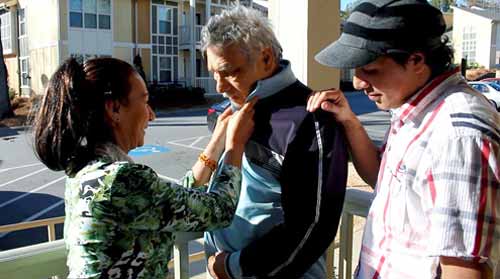Vulnerable Latino Elders Face Shortage of Geriatric Health Professionals

*In their later years my parents received the best medical care available to them. That was becasue mom was a public health nurse, so coordinating the team effort between multiple doctors and services was not difficult for her. But she wasn’t, or isn’t the norm. Geriatric care is a difficult and complicated process. It becomes even more difficult for elder Latinos when there’re few doctors who specialize in elder care and who can understand and communicate with our viejit@s. VL
 By Melody Miranda Aulet, New America Media
By Melody Miranda Aulet, New America Media
ATLANTA–When Adbonias Bonilla suffered a stroke his life came to a complete standstill, literally. Now age 70, he is supposed to be under the care of a geriatric physician to monitor his heart conditions and diabetes.
But geriatricians–elder care specialists, who dedicate their time to follow up on chronic illness–are among the scarcest group of health care professionals in the United States.
Geriatricians Can Coordinate Care
Bonilla currently visits a neurologist, cardiologist and urologist, specialists whose medical groups don’t often communicate with one another about a patient’s care. A geriatric doctor could coordinate their treatments in ways that would minimize errors and improve their care.
Research has shown for years that the fragmented system of care in this country, with little knowledge among health care professionals of elder care, often results in misdiagnosis, unnecessary or duplicate procedures and adverse drug reactions.
By 2012, in Georgia there were 127 certified geriatricians, a shortage of 315 professionals in that field, according to statistics provided by the American Geriatrics Society.
“Professions in geriatrics aren’t very popular. They lack prestige and it’s not as lucrative as other areas in medicine,” said Jonathan Flacker, a professor of geriatric medicine at Emory University School of Medicine in Atlanta.
Other experts, such as Kerstin Gerst of the Institute of Gerontology at the University of Georgia, concur about the geriatric medicine’s low level of interest among medical students. Many, she said, even see caring for seniors as a depressing career.
In spite of this, Gerst is fighting to break that stereotype by motivating her students to look into elder care in the hopes of making them aware of the need.
“I think that current generations of medical students don’t know of these problems, not because they aren’t interested, but because they haven’t been exposed to that reality,” said Gerst.
She added that many of her medical students don’t know what gerontology is. However, when she explains it to them, she convinces some that it’s not a depressive issue, but more of an “enriching field that keeps you in contact with wise people with great knowledge.” She added, “Sometimes they just need someone to talk to.”
Gerst has seen a great response from her students, because even though she has a limited number in her class, she has witnessed the change in them each semester. More than half now decide to pursue a degree in the school’s public health program, which can lead them to becoming future geriatric doctors.
Options to Close Gap
Flacker emphasized that there’s little chance there will be enough certified geriatric specialists to care for the nation’s rapidly aging population. But he said that caring for an elderly patient is a team effort. Because elder care involves both medical treatment and social services, it requires teamwork by doctors, nurses, working caregivers and others given essential training in geriatric care.
“The gap would be closed substantially if the problem can be contained before we lose control of it,” said Flacker. He also stressed the need for more funds to train those who wish to work in a high-demand profession with potentially good salaries.
In Atlanta, training courses are already available and most can be completed in a few weeks. They allow those interested in the field to learn the basic skills required to tackle the obstacles that come with taking care of an older person.
The Rosalynn Carter Institute of Caregiving offers a six-week program to train caregivers, either professionals or family members. The cost of the course is less than $100, which covers the cost of the materials.
This article was originally published in New America Media.
Melody Miranda Aulet wrote this article for Mundo Hispánico through a journalism fellowship from New America Media and the Gerontological Society of America, supported by AARP.
[Photo courtesy of New America Media]
